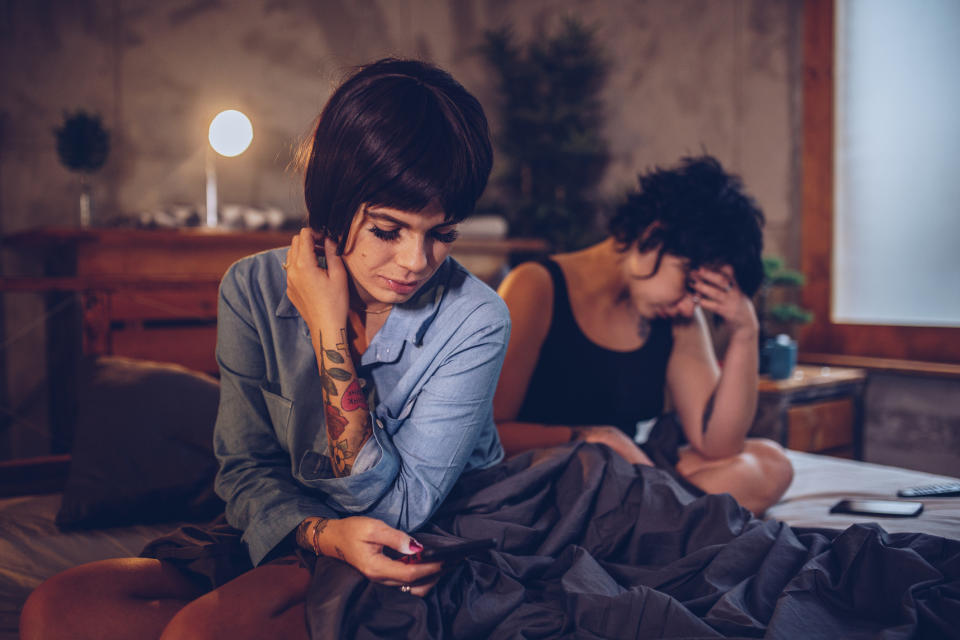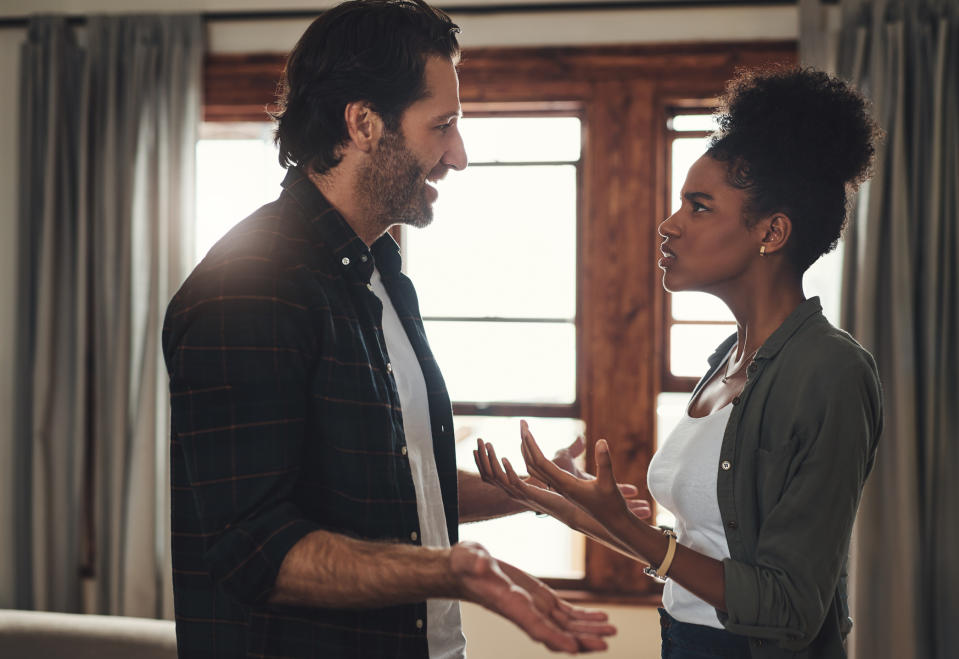Why your relationship has been changed by lockdown

For many people, the prospect of spending a week alone with their partner might prove somewhat testing. After all, being with someone 24 hours a day, no matter how much you love them, can be pretty intense.
And then came lockdown.
Suddenly we were forced to be with our significant other 24/7, with nowhere to escape after a niggly row over who left the lid off the milk.
On the other end of the relationship scale, those still in the heady honeymoon phase but not living together saw lockdown enforce a socially distanced separation, which at its height culminated in effectively a sex ban.
It’s not difficult to appreciate, therefore, that coronavirus and the resultant lockdown has wreaked havoc on many relationships.
“This year has suddenly put people’s relationships under the microscope, whether that’s because they’ve been forced apart for months on end, or because couples have been together 24/7 without leaving the house to go to work or socialise,” says eharmony’s relationship expert Rachael Lloyd.
Friday 9 October marks 200 days since the UK was plunged into lockdown, and many couples are still coming to terms with the fact that the romantic relationship they are now in isn’t quite the same as it was pre-pandemic.
Read more: Online daters can tell if they have a connection in just 30 seconds, research reveals

“Lockdown was a difficult time with restrictions on what we can do, uncertainty about the future, fears of getting COVID-19, being trapped in the same space as our partner and children,” explains Neil Wilkie, psychotherapist, relationship expert and creator of online couples therapy platform The Relationship Paradigm.
“In our old life we would have the opportunity of escape to work or go out with friends, the gym, or the pub, but during lockdown we had to stay in, play Scrabble, watch Netflix and disappear down the black hole of social media.”
Wilkie has dubbed this period “Isolationship” and says it came with both positives and negatives.
“Though [lockdown] offered a great opportunity to spend more time with people you love; it was also a time where frustration and resentments could grow, and that love could start to dissipate,” he adds.
Watch: Dating at a distance
Not all relationships will have weathered the lockdown storm in the same way. While some may have found upping the time together encouraged a new intimacy, for others the constant togetherness could have magnified any tension and problems that existed pre-lockdown.
According to Wilkie whether couples thrived or struggled during the pandemic may have been influenced by whether they chose to embrace the unique romantic opportunities lockdown presented.
“If they have used the time well, it will be a great foundation to the relationship,” he explains.
“They will have explored each other; physically, sexually, emotionally. They will have communicated well, talked about feelings. They will have resolved irritations and differences. They will have had fun together and prolonged the honeymoon period.”
Wilkie also believes those couples who found themselves in a sort of lockdown love bubble could have experienced a growth in trust because they will have had fewer distractions.
Read more: Science has discovered the perfect flirting face used by women

But couples who did not embrace the time in lockdown may have found themselves on shaky foundations, particularly if in a new relationship.
“The honeymoon period will have been rudely interrupted by being trapped together and noticing each other’s less appealing habits,” Wilkie explains.
“They will have allowed small irritations to grow. They will have been in fight or freeze mode, as flight was not an option until the doors open to the outside world.”
All this, he says, adds up to lockdown being an effective means for testing whether a relationship can thrive or not.
“If couples accepted the reality of what there was and focussed on building communication, connection, commitment, fun, growth and trust,then lockdown was a wonderful opportunity to build a great foundation for their relationship,” he explains.
“If instead, they chose to be frustrated by the limitations, the restrictions and what is wrong that may have caused the foundations to crumble and the relationship to fail.”
Read more: Why honest people sometimes cheat, study reveals what's going on in their minds
The rise of the ‘turbo’ relationship
As well as proving pivotal in terms of a relationship success or slump, lockdown also spurred the speeding up of many fledgling pairings, with many going from ‘first date’ to ‘forever after’ in the space of a few short months.
Enter the turbo relationship.
In ordinary life switching from sharing a bottle of wine to sharing an actual home within weeks of meeting might cause the ringing of “too much, too soon” alarm bells, but interestingly many of those who entered this kind of fast forward relationship are reportedly thriving.
Turns out navigating lockdown as a pair made close to two-thirds (63%) feel their relationship was stronger, and over half (58%) now know they want to be with their partner forever, research from Relate and eharmony reveals.
Moving forward more quickly has also meant over a third of those newly living with a partner believe the two months over lockdown felt “more like two years of commitment”.
“What’s nice, is that these so-called ‘turbo-relationships’ have also helped over half of couples (59%) feel more committed to their partner,” Lloyd says of the trend.
Wilkie believes it makes sense that many couples threw themselves into turbo relationships this year.
“In times of danger and uncertainty we need comfort and closeness,” he explains. “We do not want to be alone.
“In lockdown the choice of partners was more limited, and therefore we may have seized onto what was there because that was the best choice we had in that moment.”
But Wilkie has some words of caution for anyone who did find themselves getting together with someone more out of circumstance than choice.
“The danger is that, now that the door on lockdown is finally open, that primal need for company and security will diminish,” he explains. “Also, people will be able to socialise more widely and see that there is a much greater choice out there.”
Read more: Divorcing couples stop blaming each other as adultery claims drop by half in decade
The easing of lockdown may also have provided a catalyst for reflection on a current relationship, as well as glassy-eyed positivity about potential new partners.
“Couples may look forward at others through the lens of possibility and look back at the lockdown period through the lens of negativity,” Wilkie explains.
“They may focus on what was wrong with their partner, what irritated them and get this out of context. This will help couples who did not have a great lockdown experience to justify their reasons for breaking up.”
And of course there have been breakups. In a survey of 2,058 UK adults, to mark Relate charity’s Relationship Week, earlier this year, 8% came to the conclusion that they needed to end their relationship.
While a further survey from eharmony found one in seven couples (14%) attributed lockdown for making them realise that their relationship was done.

So what now for our relationships?
If you’ve survived lockdown but your relationship has taken a bit of a battering, that doesn’t necessarily mean it can’t be saved.
“Now that we are in a different and more ambiguous phase, we will all be experiencing different feelings and our journey to the ‘new normal’ will be at different speeds,” Wilkie explains.
“We will also be bringing with us different baggage of fear, frustration, irritation, resentment as well as positive feelings of joy, gratitude and reconnection with what is really important. We can choose which to carry forward and which to leave behind.”
Wilkie says that with so much change, it is a great time for couples to pause and reflect on what has gone well in the relationship and what could be even better.
“If this is done with an attitude of openness, honesty and wanting to co-create a better future then the relationship can only improve,” he advises.
“If couples wait, the likelihood is that frustrations and resentments will be suppressed and leak out in disconnection or arguments, then the relationship is likely to deteriorate.”
Read more: 'I go on dates but don't get asked out again – what am I doing wrong?'
How to help your relationship thrive in the COVID-19 era
Calibrate where you are
Wilkie suggests giving scores out of 10 (where 10 is wonderful and 1 is awful) for each of the key elements of your relationship: communication, connection, commitment, fun, growth and trust.
“Share your scores and talk through the similarities and differences,” he recommends. “Then agree just one step that you are both going to take, that week, to improve on one priority.
“Repeat every week until you are both happy with the relationship.”
Learn to express your feelings
If your partner is doing things that irritate or upset you; tell them how that makes you feel. “Do this in the moment rather than burying it and allowing it fester,” Wilkie says. “Use words like ‘I feel…’ and avoid blaming words like ‘You…’ This helps you dig below the stuff and into the real feelings.”
Schedule a progress report
Once a week, Wilkie recommends setting aside time for a couple’s meeting. “Reflect on what has gone well in your relationship and what could be even better,” he suggests. “Share appreciation of five positive things your partner has done and then choose one issue in your relationship that could be better. Explain why this is important to you and what you would like.”
Hug it out
According to family therapist, Virginia Satir, we need four hugs a day for survival, eight for maintenance and 12 for growth. “They should be at least 20 seconds each to get the feel-good hormone, Oxytocin, flowing,” adds Wilkie.
Carve out couple time
“Make dinner or other mealtimes special occasions where you are sitting together, free of electronic distractions and can just talk,” Wilkie suggests.
“Ensure that when you part in the morning and come back at night that you say hello and goodbye in a way that makes you both feel connected.”

 Yahoo Lifestyle
Yahoo Lifestyle 


